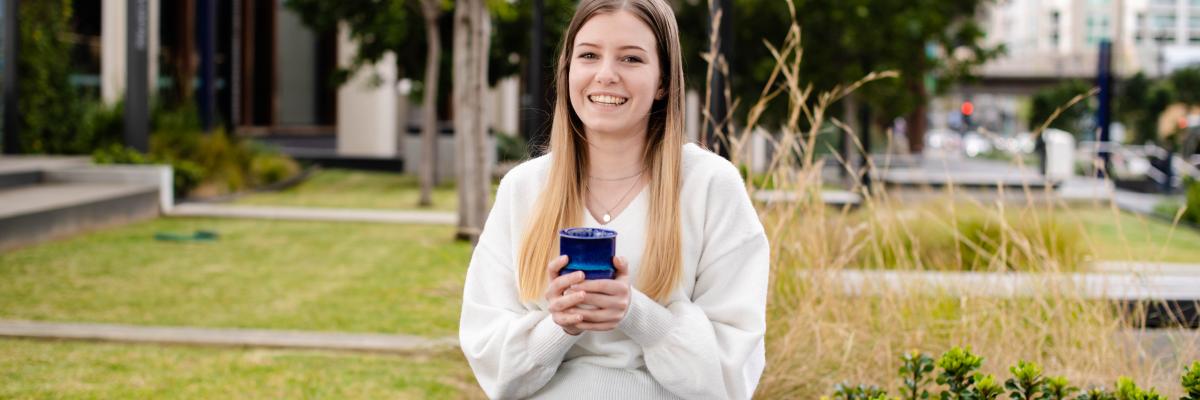Connected Conversations | Khalia Primer
A first-year human biology course steered 2020 Three Minute Thesis winner, Khalia Primer, on a path to biochemistry and genetics. Working on her PhD in SAHMRI’s Vascular Research Centre, Khalia hopes to understand the effects of diabetes on blood vessel cells and vascular complications.

Please tell us a little bit about yourself.
My name is Khalia and I’m a third-year PhD candidate in the Vascular Research Centre at SAHMRI. My research focuses on understanding the effects of diabetes on blood vessel cells and vascular complications. In particular, we’re trying to develop new therapies that will help people with diabetes grow new blood vessels to help heal chronic wounds and prevent heart attacks! I’ve always been fascinated by human biology, so completing a PhD in an area where I can study interesting diseases and potentially make a difference in peoples’ lives was the perfect fit for me!
Where did you do your undergraduate studies?
I did a Bachelor of Science (Advanced) here at the University of Adelaide. I started off thinking I might like to study zoology or ecology, but then took a human biology course in first year and found it so fascinating that I decided to major in biochemistry and genetics.
What do you love most about studying now at Adelaide?
Definitely my lab group! I’ve made some amazing friends since joining the Vascular Research Centre, and I know I’ll keep in touch with them throughout my entire career. Having such a wonderful support network is what makes doing my PhD so enjoyable.
What would you say to your 18-year-old self, commencing their time at university?
I would tell her to PLEASE attend all her lectures! She definitely wouldn’t listen, but it’d be worth a shot.
Why would you encourage some to pursue a career in health?
In my opinion, there’s nothing more fascinating or complex than the human body and mind. There are so many things we still don’t understand, and so many diseases we still have no way to cure. Tackling these problems is so interesting and has the potential to be incredibly rewarding.
What are you working on now?
Right now, I’m working on understanding how diabetes affects the metabolism of endothelial cells, which are the cells that line the inside of our larger blood vessels and are responsible for forming new vessels. The way these cells metabolise fuel is a critical part of their ability to form new blood vessels, and we know that diabetes alters this. I hope that, in understanding the effects of diabetes in that process, we can create new therapies that will correct the damage.
What do you do in your spare time?
When I’m not doing PhD work I try to find time to do some Pilates or go for a run, but usually I’m working on other projects I have going! I’m currently convening the SA branch of the Australian Society for Medical Research which involves overseeing events like our Scientific Meeting, and I’m working with the SAHMRI Students Association to organise social and professional development events for students based at SAHMRI.
I’m also currently working on an analysis of state-based R&D policy across Australia, with the end goal of opening channels of communication between researchers and policymakers, and enabling medical researchers to engage more easily in advocacy for research. This is something I’m very passionate about and am really enjoying working on!
How do you relax or switch off?
Switching off can definitely be difficult, but something I’ve been trying to do more of recently is read non-PhD-related books! I’ve found it really helpful to put my phone on the other side of the room and just sit down and focus on a book for a while. Right now, I’m reading The Dictionary of Lost Words by Pip Williams.
What are your hopes for 2021?
So many things! But if I had to narrow it down to a couple, I hope that we’ll have no need for any more lockdowns, that the vaccine rollout will go smoothly, and that all my experiments will work perfectly.
Name three things you won’t forget about the past year…
- Winning the Uni’s Three Minute Thesis final! That was an extremely unexpected and exciting moment.
- Publishing my first paper; that was a very important milestone for me.
- The first day I came back to SAHMRI after being in isolation for two months.
